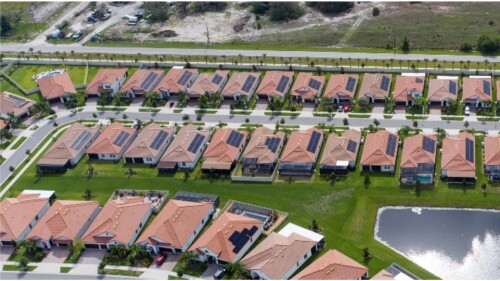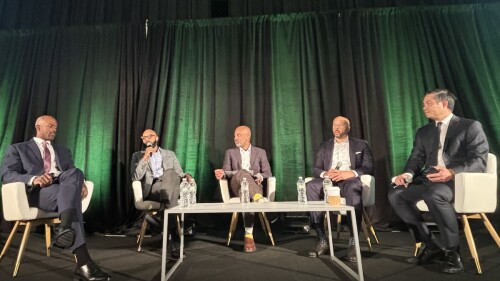This year, global investors should be keeping an eye on politics in China, Japan’s outbound investment, and the logistics sector, said a panel of senior industry figures speaking at the recent ULI Asia Pacific Summit 2017.
A panel moderated by Allianz global head of real estate François Trausch at the event in Singapore covered a lot of ground, from politics to the best sectors to invest in.
The panel briefly addressed the impact of recent U.S. elections on the real estate industry, particularly with regard to relations with China. Ryan Botjer, head of China for Tishman Speyer, said, “I have been flying between the U.S. and China for 20 years, but the past four to five months have been the first time the planes haven’t been full.”
China’s domestic politics could be due for significant change later this year, when the 19th National Congress of the Communist Party of China is held in Beijing. At this fall meeting, most of the ruling Politburo will step down with new leadership elected. Premier Xi Jinping is expected to remain in office, but many other leaders are due to retire.
Joseph Gagnon, managing director at Warburg Pincus Asia, said: “Until the reshuffle, China will be very quiet politically. You’ll see very little in the way of policy. However, in 2018 and 2019 we could see a lot more reforms.”
He added that the Economist Intelligence Unit predicted that a raft of reforms, which could include changes to state-owned enterprises, would slow gross domestic product (GDP) growth to 4.7 percent in 2018 and 2019, from a forecast 6.7 percent this year.
China’s ongoing campaign against corruption, which has led to a number of high-profile imprisonments of senior state officials and businesspeople, is set to take a new turn, Gagnon added. “For the past 12 months, the focus has been on the energy sector, but now it is turning to the finance sector.”
However, he said: “We believe this is positive in the long term; these actions are good and necessary.”
Turning to Asian outbound investment in real estate, Shuji Tomikawa, president of Mitsui Fudosan Investment Advisors, predicted that Japan’s largest funds could have made their first foreign real estate investments by the middle of next year.
The nation’s largest financial institutions, “the whales,” such as the Government Pension Investment Fund, which has $1.2 trillion of assets under management, have embarked on investment plans and others would follow, he said.
Jon Zehner, LaSalle Investment Management global cohead of client capital, said that smaller Japanese funds were already investing in LaSalle products and that five corporate pension funds had invested in some of LaSalle’s recent vehicles.
Chinese restrictions on outbound capital were having an effect, but large state-owned enterprises could still buy, as China Investment Corporation’s $14 billion purchase of Logicor, a European logistics platform, showed, the panel agreed. “The impact [of capital controls] has been greatest on retail investors,” Botjer said.
A poll of the audience showed that attendees expected U.S. and Chinese investors to be the biggest cross-border players in Asian real estate over the next 12 months, but the panel disagreed somewhat, particularly with regard to the activity of U.S. investors. “We think intraregional capital will be the most significant,” said Zehner.
The audience was dismissive of the role that European capital would play in the Asia Pacific region over the next 12 months, but Trausch pointed out that Allianz had invested $500 million in the region in the previous 12 months and planned to keep investing in Asia.
The popularity of logistics real estate in Asia Pacific will continue, panelists said. Warburg Pincus, LaSalle, and Mitsubishi are all investors in the sector. Gagnon said: “One of the reasons we like logistics is the short build cycle, which means the market can adjust quickly to supply and demand.”
Tomikawa said that staffing was a problem for logistics facilities in Japan, which has nearly full employment. Trausch said he had toured a modern logistics warehouse in Japan where the staff facilities were “like a five-star hotel” in order to retain staff.
Australia has been very popular with foreign investors and this looked set to continue, the panel agreed. “It is still attractive, but at current pricing demands more caution,” Zehner said.
Gagnon said Australia’s economy correlated “very strongly” with China due to the resources sector and added that Sydney and Melbourne are among the region’s fastest-growing cities. “There is a big migration story,” he said.
Capital pressure on asset prices is set to continue and this was generating more interest in niche sectors. Zehner said that investors worldwide were keen to buy multifamily residential, which is not an established sector in the Asia Pacific region.
Senior living is a sector that ought to work in China and Japan in particular, said Tomikawa and Gagnon, but in both countries it was hard to find good operators. In China, the business has still not found an ideal operating model, Gagnon said.
Botjer pointed to the huge potential spending power of China’s older citizens over the next 15 to 20 years, as today’s highest earners—the first generation of modern Chinese people to become wealthy—retired.
In keeping with the overall theme of the conference—technology and real estate—the panel was asked to identify key technologies changing their business. Trausch said that Allianz had been using drones to carry out site visits and had found the images they produced very helpful. “We get more from the drones than the staff who visit the site sometimes,” he joked.
Botjer said virtual reality and augmented reality were beginning to make a real difference to developers, while Zehner said that developments in online and mobile shopping and their follow-on effects on retail and logistics property were still the main tech story for him.




